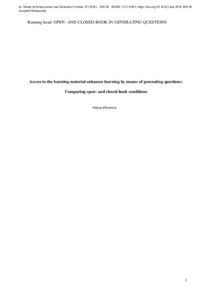Aufsatz

Access to the learning material enhances learning by means of generating questions: Comparing open- and closed-book conditions
Zusammenfassung
Generating questions referring to the learning material is a powerful learning strategy. The present study investigated potential mechanisms behind this effect. Students (N=231) read a text and then generated questions referring to the text in three conditions: (1) open-book (i.e., text accessible), (2) closed-book (i.e., text inaccessible), and (3) cued closed-book (i.e., text inaccessible but keywords provided). After one week, students’ knowledge gain was larger in the open-book and cued closed-book conditions compared to a restudy control condition. No difference emerged between the closed-book and the restudy condition. The number of generated questions was positively correlated with students’ knowledge gain, whereas question depth was not. Results suggest that the effect of question generation may not be attributed to retrieval practice or higher-order thinking. More probably, rephrasing and learners’ active engagement with the learning material, as reflected by the number of generated questions, might contribute to the effect.
Zitierform
In: Trends in Neuroscience and Education Volume 19 (2020) eissn:2211-9493Zitieren
@article{doi:10.17170/kobra-202108234626,
author={Ebersbach, Mirjam},
title={Access to the learning material enhances learning by means of generating questions: Comparing open- and closed-book conditions},
journal={Trends in Neuroscience and Education},
year={2020}
}
0500 Oax
0501 Text $btxt$2rdacontent
0502 Computermedien $bc$2rdacarrier
1100 2020$n2020
1500 1/eng
2050 ##0##http://hdl.handle.net/123456789/13323
3000 Ebersbach, Mirjam
4000 Access to the learning material enhances learning by means of generating questions: Comparing open- and closed-book conditions / Ebersbach, Mirjam
4030
4060 Online-Ressource
4085 ##0##=u http://nbn-resolving.de/http://hdl.handle.net/123456789/13323=x R
4204 \$dAufsatz
4170
5550 {{Hochschule}}
5550 {{Lehre}}
5550 {{Lerntest}}
5550 {{Lernpsychologie}}
5550 {{Wissenserwerb}}
7136 ##0##http://hdl.handle.net/123456789/13323
<resource xsi:schemaLocation="http://datacite.org/schema/kernel-2.2 http://schema.datacite.org/meta/kernel-2.2/metadata.xsd"> 2021-10-25T14:09:22Z 2021-10-25T14:09:22Z 2020 doi:10.17170/kobra-202108234626 http://hdl.handle.net/123456789/13323 eng Urheberrechtlich geschützt https://rightsstatements.org/page/InC/1.0/ question generation closed-book open-book long-term retention retrieval practice University learning 150 Access to the learning material enhances learning by means of generating questions: Comparing open- and closed-book conditions Aufsatz Generating questions referring to the learning material is a powerful learning strategy. The present study investigated potential mechanisms behind this effect. Students (N=231) read a text and then generated questions referring to the text in three conditions: (1) open-book (i.e., text accessible), (2) closed-book (i.e., text inaccessible), and (3) cued closed-book (i.e., text inaccessible but keywords provided). After one week, students’ knowledge gain was larger in the open-book and cued closed-book conditions compared to a restudy control condition. No difference emerged between the closed-book and the restudy condition. The number of generated questions was positively correlated with students’ knowledge gain, whereas question depth was not. Results suggest that the effect of question generation may not be attributed to retrieval practice or higher-order thinking. More probably, rephrasing and learners’ active engagement with the learning material, as reflected by the number of generated questions, might contribute to the effect. open access Ebersbach, Mirjam doi:10.1016/j.tine.2020.100130 Hochschule Lehre Lerntest Lernpsychologie Wissenserwerb acceptedVersion eissn:2211-9493 issn:2452-0837 Trends in Neuroscience and Education Volume 19 false 100130 </resource>
Die folgenden Lizenzbestimmungen sind mit dieser Ressource verbunden:
Urheberrechtlich geschützt

